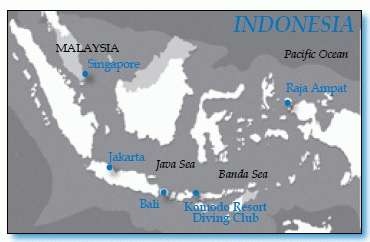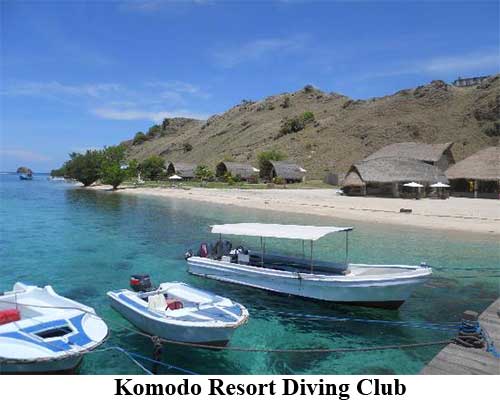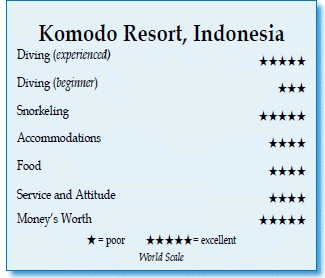Komodo Resort Diving Club, IndonesiaContents of this Issue: Kona Diving Company, Kailua-Kona, Hawaii Aqua Lung Recalls All BCs with SureLock II Weight Pockets What’s a Heated Vest, and Should You Buy One? Komodo Resort Diving Club, Indonesia The “Ship of Gold” Treasure Hunter Captured In Florida Lionfish Aren’t the Only Invaders in Florida Waters Stop Panic Before It Starts Underwater Dead Diver’s Wife Sues a Shadow Diver Star Want to Put Your Name on a Reef? Got $100,000? Editorial Office: Ben Davison Publisher and Editor Undercurrent 3020 Bridgeway, Suite 102 Sausalito, CA 94965 exciting diving at budget prices from the March, 2015 issue of Undercurrent
Dear Fellow Diver: In preparing for my first trip to Indonesia, I had a tough choice: Raja Ampat or Komodo? So as to not bust my budget for the first seven days, (with nine more after that), Komodo Resort Diving Club, averaging $250 per person, per day, for room, food and diving won out. Built from the ground up by a couple of Italian fellows, the Komodo Resort is on the desert-like Sebayur Island, smack dab in the middle of the Flores Sea, about halfway between Labuan Bajo (where one arrives by air from Bali) and Komodo Island. I came without my BC and wetsuit because the resort advertised all gear for rent; some of their rental stuff is a little long in the tooth, but serviceable. Most divers, mainly European, also seemed to be renters, not bringing much beyond their cameras and masks. With no real "dedicated dive shop," I would have been out of luck had I needed any nonessential accessory.
Since this arid part of Indonesia has less rainfall, the Komodo Resort owners have planted trees and foliage to mitigate the barrenness. The resort's architecture tends toward a typical tropical motif, with straw or palm roofs on the 14 wooden, air-conditioned bungalows. Though I saw few winged pests, mosquito nets enshrouded the soft beds. While the resort has a desalinization plant, water was limited, and short showers were mandated. And you flush your toilet the old-fashioned way, by filling up the bowl with a bucket after you deposit your toilet paper in a bin -- an annoyance, but better than fishing your spent toilet paper out of the toilet when you mistakenly put it in there. Glad I brought hand sanitizer. Out front, I had a small patio and deck with a couple of chairs, but a few steps more and I was on the beach and in a lounge chair under an umbrella. Walking back to my bungalow one afternoon, a guy walked out on his porch butt-naked, hung something out to dry and walked back inside. Oh, those Europeans. While they have a variety of boats, I was normally on the largest, which held two groups of five to seven divers plus a divemaster for each group. Before each dive, I tuned into their extensive briefing, with hand-drawn pictures showing the reef topography and the life one might encounter. Head divemaster Roberto, an old salt, was the chief diver at a Hilton Maldives resort when I once stayed there, though we didn't cross paths then. Having dived all over the world, he is a no-nonsense Italian -- not overbearing, but once you get on board the boat, you follow his rules. Tardy divers got an earful. (The boats frequently needed to arrive at a spot by a specific time to catch the currents in the proper orientation and maximize what the spot could offer.)
The dining area is open-air with a big roof. With Italian owners and managers, what else to expect from the chef but good food with, well, a heavy Italian/European influence? This happened particularly at dinner time, which is served in three courses, with Italian or Indonesian choices for each course, usually including both options with a seafood course. Lunch is similarly broken down between two different offerings. Breakfast is served buffet-style. The small bar, a stone's throw from the beach and pier, has a mix of large bean-bag-type cushions, chairs and tables. It looked better than its limited drink menu, but didn't prove to be much of a venue for socializing divers -- a lot of people only used the spot to hook up to the Internet. People dined together in their individual groups, with not much cross-talk between them. There were a lot of Italians who hung out together and with the staff, and the Asian divers kept to themselves. I connected with two Swiss expats living in Malaysia, who joined my partner and me when we took the Rinca Iisland excursion to see the Komodo Dragons. Apparently, an American travel agency is beginning to sell this destination, which should bring more of my countrymen here. On my first two dive days, I either dived flourishing reefs with no current, or a small island that had currents on either side which that we were told to avoid. It wasn't until dive day three at Makasar Reef that things heated up. That day was all about the current, similar to Palau's Ulong Channel, but the rollercoaster was over barren terrain until we got dumped on a splendid reef loaded with titan and yellow margin triggerfish, turtles and schools of spadefish. Normally, clown triggers run off before I can get my camera level with them, but a nest guardian refused to budge and then tried to run me off with two fake charges. I'll admit it -- I flinched.
That night, my buddy and I did a dive at Mini Wall, about 10 minutes from the resort. Halfway through our dive, several divers from a nearby liveaboard jumped in, and with all those lights going, the scene looked like something out of James Cameron's film The Abyss. But there were indeed critters, notably two stonefish species, a crawling cowrie and a large grand pleurobranch. A three-tank excursion to the north end of Komodo the next day brought raging currents. Castle Rock reminded me of Blue Corner, though it's more of a mound than a corner. Sea life was everywhere. Trevally, turtles, dogtooth tuna, jacks, small black- and white tip-sharks, and big schools of smaller reef fish hovered at the edges of the 70-foot visibility. During the second dive at the Cauldron, I traversed in and out of current zones, with no warning when the current would stop or start. One of the divemasters handed my buddy and me hooks. I wanted to wave my arms and hand signal, "You had those all this time and didn't pass them out earlier?" Instead, I gratefully took them and hooked in. At Crystal Rock, I also hooked in to watch the spectacle. A massive oceanic grouper seemed to preside over the area, while jacks, trevally, barracuda and an occasional small shark moved among the reef fish. After a time, I unhooked and drifted back to a calmer spot where I spotted lionfish, various sea slugs, blue spotted ray, and a yellow and black Spanish dancer on the move. Definitely, this day was the highlight. I give the Komodo Resort top marks, especially considering its isolation and price. Sure, one has to make adjustments to resort life style on a private island in the middle of nowhere, but I left impressed with what they put together in just a couple of years. A great house reef and some spectacular current diving mean real potential, and if they get faster dive boats to increase the range, it will enhance the notion that this is a go-to destination for a decent price. But two things concern me. Between the piers at the Labuan Bajo harbor, where we boarded the boat for transportation to the resort, I saw all manner of plastic clutter bobbing about. I stopped counting items when I reached 30 -- and that was just between two piers. There wasn't a dive day when I didn't travel to a dive spot and see plastic floating on the surface, even plastic on the bottom. One day, an empty motor oil bottle washed up on the resort's beach. Not good. And while I saw all sorts of reef fish and muck critters, the larger apex types were few. I saw the occasional dogtooth tuna, trevally and lone barracuda, but the schools were small. Perhaps my expectations were out of line or I was just unlucky and wasn't at an individual reef at the right time. But overfishing is taking its toll in Indonesia, and the pollution was depressing. The nation needs to get serious about its waters if it wants to maintain Komodo as an ecotourism destination that's known for more than just its Dragons. -- S.D.
|

I want to get all the stories! Tell me how I can become an Undercurrent Online Member and get online access to all the articles of Undercurrent as well as thousands of first hand reports on dive operations world-wide
| Home | Online Members Area | My Account |
Login
|
Join
|
| Travel Index |
Dive Resort & Liveaboard Reviews
|
Featured Reports
|
Recent
Issues
|
Back Issues
|
|
Dive Gear
Index
|
Health/Safety Index
|
Environment & Misc.
Index
|
Seasonal Planner
|
Blogs
|
Free Articles
|
Book Picks
|
News
|
|
Special Offers
|
RSS
|
FAQ
|
About Us
|
Contact Us
|
Links
|
3020 Bridgeway, Ste 102, Sausalito, Ca 94965
All rights reserved.

 The wooden dive boats, like most in this area, are slow for those who
are used to high-speed boats, but they have enough room so that I didn't feel
cramped. After getting underway, most people scampered to the top to flop on
giant bean bags under a canvas top. Slow boats with rides up to an hour meant
limited range: Any island in the north and east areas that are surrounded by
Komodo, Rinca, and Flores Islands was accessible, but not those to the west and
south. Nonetheless, the sites we reached had plenty to hold my attention. If
I may use Palau as a measuring stick, the reefs on Komodo's north and northeast
sides had more diversity in both corals and reef animals. I saw vast areas
of unique Flores Sea animals and critters, things I did not know even existed, as well as huge barrel sponges,
impossibly long moray eels, large
Napoleon wrasses and pleurobranchus (beautiful sea slugs), all set in a
coral background showing little sign
of bleaching and only a few dead
patches. While the ocean surface
appeared glass-flat, upon closer
inspection, I saw water boils all
over the place, caused by current
upwellings. The ocean was raging
under that seemingly calm surface
-- a good sign for marine life.
The wooden dive boats, like most in this area, are slow for those who
are used to high-speed boats, but they have enough room so that I didn't feel
cramped. After getting underway, most people scampered to the top to flop on
giant bean bags under a canvas top. Slow boats with rides up to an hour meant
limited range: Any island in the north and east areas that are surrounded by
Komodo, Rinca, and Flores Islands was accessible, but not those to the west and
south. Nonetheless, the sites we reached had plenty to hold my attention. If
I may use Palau as a measuring stick, the reefs on Komodo's north and northeast
sides had more diversity in both corals and reef animals. I saw vast areas
of unique Flores Sea animals and critters, things I did not know even existed, as well as huge barrel sponges,
impossibly long moray eels, large
Napoleon wrasses and pleurobranchus (beautiful sea slugs), all set in a
coral background showing little sign
of bleaching and only a few dead
patches. While the ocean surface
appeared glass-flat, upon closer
inspection, I saw water boils all
over the place, caused by current
upwellings. The ocean was raging
under that seemingly calm surface
-- a good sign for marine life. Normally, I'd take the 8 a.m. two-tank dive (some days there were threetank
trips), which returned before 1 p.m. for lunch. On afternoons, I either
took a 3 p.m. boat dive or snorkeled the house reef, which, with all its diversity,
was terrific. I saw no need for a tank because the best areas were very
shallow at low tide. I saw a school of 300 brassy trevally at 10 feet, a threefoot-
long barracuda slumming it in the shallows at five feet, shrimpfish,
needlefish, pipefish, an invasion of
horned sea stars feeding off the grasses,
and both soft and hard corals that
one would not find in such good condition
at that surface level in most populated
areas of the world. Though I didn't find
the beautiful but deadly blue-ring octopus,
I was assured they're present.
Normally, I'd take the 8 a.m. two-tank dive (some days there were threetank
trips), which returned before 1 p.m. for lunch. On afternoons, I either
took a 3 p.m. boat dive or snorkeled the house reef, which, with all its diversity,
was terrific. I saw no need for a tank because the best areas were very
shallow at low tide. I saw a school of 300 brassy trevally at 10 feet, a threefoot-
long barracuda slumming it in the shallows at five feet, shrimpfish,
needlefish, pipefish, an invasion of
horned sea stars feeding off the grasses,
and both soft and hard corals that
one would not find in such good condition
at that surface level in most populated
areas of the world. Though I didn't find
the beautiful but deadly blue-ring octopus,
I was assured they're present. The next day, we hit Saba Kecil, a raging current drift dive first along
a wall, then across a slope with ledges and overhangs -- places I could duck
in to get off the express. But reef hooks should be mandatory, because the currents
rip too hard to mess around with ducking into quiet spots. It's better to
hook out in the open and take the force of the currents head on. I closely monitored
my computer to make sure I wasn't blowing through my air due to having
to kick really hard. Between the dives, crew offered up tea or water and cookies.
At a high of nearly 80 degrees,
water temperatures were warmer than
Hawaii but cooler than Palau and Yap.
The next day, we hit Saba Kecil, a raging current drift dive first along
a wall, then across a slope with ledges and overhangs -- places I could duck
in to get off the express. But reef hooks should be mandatory, because the currents
rip too hard to mess around with ducking into quiet spots. It's better to
hook out in the open and take the force of the currents head on. I closely monitored
my computer to make sure I wasn't blowing through my air due to having
to kick really hard. Between the dives, crew offered up tea or water and cookies.
At a high of nearly 80 degrees,
water temperatures were warmer than
Hawaii but cooler than Palau and Yap. Divers Compass: Several airlines fly to Labuan Bajo from Denpasar,
Bali; I chose Garuda Indonesia because it is purported to have
the better operation, and it offered a free checked bag if it's
full of "sports equipment" (a.k.a. your dive gear) . . . At the
Labuan Bajo airport, I was met by resort staff, who took me to
the local office to fill out paperwork, then drove me to the harbor,
where I took a chartered boat to the resort, which can take
anywhere from 90 minutes to three hours; you must make arrangements
prior to arrival, and for sure pay extra for the faster
90-minute ride . . . Depending upon the value of the dollar against the Euro, a
week runs about $1,500-$1,900, double occupancy, with three meals and two daily
dives . . . The resort has a decent library of sea life ID books . . . Charters
are available to see Komodo dragons or take a pink-sand beach snorkeling excursion,
but there's a four-person minimum . . . The resort only sells hooks, it
doesn't lend them out, but either the lines were too short or the hooks too big
for my taste; hooks would definitely have been useful on half my dives . . .
Night dives are available on request . . . Website:
Divers Compass: Several airlines fly to Labuan Bajo from Denpasar,
Bali; I chose Garuda Indonesia because it is purported to have
the better operation, and it offered a free checked bag if it's
full of "sports equipment" (a.k.a. your dive gear) . . . At the
Labuan Bajo airport, I was met by resort staff, who took me to
the local office to fill out paperwork, then drove me to the harbor,
where I took a chartered boat to the resort, which can take
anywhere from 90 minutes to three hours; you must make arrangements
prior to arrival, and for sure pay extra for the faster
90-minute ride . . . Depending upon the value of the dollar against the Euro, a
week runs about $1,500-$1,900, double occupancy, with three meals and two daily
dives . . . The resort has a decent library of sea life ID books . . . Charters
are available to see Komodo dragons or take a pink-sand beach snorkeling excursion,
but there's a four-person minimum . . . The resort only sells hooks, it
doesn't lend them out, but either the lines were too short or the hooks too big
for my taste; hooks would definitely have been useful on half my dives . . .
Night dives are available on request . . . Website: 